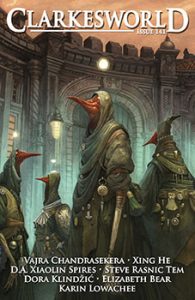Each month, Daniel Haeusser reviews short works of SFT that appear both online and in print. He is an Assistant Professor in the Biology Department at Canisius College, where he teaches microbiology and leads student research projects with bacteria and bacteriophage. He’s also an associate blogger with the American Society for Microbiology’s popular Small Things Considered. Daniel reads broadly in English and French, and his book reviews can be found at Reading1000Lives or Skiffy & Fanty. You can also connect with him on Goodreads or Twitter.
 “Your Multicolored Life” by Xing He, translated from the Chinese by Andy Dudak
“Your Multicolored Life” by Xing He, translated from the Chinese by Andy Dudak
Clarkesworld Magazine #141
The grass is always greener on the other side. This dystopian tale features two men seeking freedom in a future world where they each are seemingly under the control of robots. Zhang Hua, a malnourished ore porter slave, dreams of escape from a mine that is guarded by robotic wardens with guns and flame throwers. You Ruo, a well-fed ‘unconventional’ thinker kept on a compound to utilize his cultivated mental abnormalities, dreams of revolution against his machine overlords. Each fleeing from respective captivity, the two meet only to find that they each yearn for what the other escaped. The comforts of You Ruo’s camp attract Zhang Hua, while the potential revolutionary recruits at Zhang Hua’s slave mine attract You Ruo. The story is an interesting take on concepts of freedom, but rather pessimistic and problematic in its ultimate end, particularly in the theme of an individual changing versus staying in ‘one’s place’ in society.
 “Silver Tiger” by Lu Yang, translated from the Chinese by Eric Abrahamsen
“Silver Tiger” by Lu Yang, translated from the Chinese by Eric Abrahamsen
New Yorker, June 4 & 11, 2018
One of three short stories in a special issue on the theme of ‘Childhood’, this is a delightful – if at times intense – piece of magical realism that captures the wonder, beauty, and trauma of that time period transitioning into pubescence. Yang vividly paints village life with a cast of memorable characters. Protagonist Ah Yang relates a short chapter from his life with a unique voice that occasionally switches from first person to referring to himself in the third person. This parallels moments of emotional shock where he senses the presence of a silver tiger, experiences of detachment, almost out-of-body. Each silver tiger is different, or maybe it has just changed its nature. A brief story, but one with many possible interpretations.
![]() “Woodcutter and Crows” by Shahidul Zahir, translated from the Bengali by Layli Uddin and Mir Rifat Us Saleheen
“Woodcutter and Crows” by Shahidul Zahir, translated from the Bengali by Layli Uddin and Mir Rifat Us Saleheen
Samovar Magazine
In a small village ~100 km outside of Dhaka, the capital of Bangladesh a landless woodcutter named Akalu lives with his wife Tepi. A simple and honest man, Akalu resigns himself to life and the oddities of Tepi, who mutters to herself, grinds her teeth, and talks to crows. When Akalu finds a bag with money in it he seeks advice for what to do but finds that everyone wants to share in his wealth. This is the start to a sequence of events leading Akalu and Tepi out of the village in a series of turning fortunes that Tepi, and others, attribute to the power of the crows over human life. From the biography of Zahir it seems he mostly wrote fables such as this one, introducing readers to Bangladeshi culture. This tale, written in straightforward language with bucolic characters, highlights the ways in which society can oppress or take advantage of those who permit such treatment, those that blame such misfortune on supernatural turns rather than social injustice.
“Beyond the Western Pass” by Di An, translated from the Chinese by Canaan Morse
Samovar Magazine
A woman with Alzheimer’s narrates her perception in the days approaching death. Amid tender fragments of memory she encounters family never fully recognizes and enters dreams where she is again nineteen, accompanied and guided by a kind, blue horse. I would not even classify this story as magical realism. However, rich in symbolism for life, death, and our approaches to both, it is exquisite.
